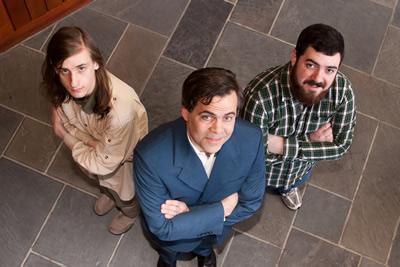Gallic Gateway

"The wiki has been proving a helpful resource," says Brendan Boston '11. "The popularity and utility of the resource will only increase with time." From left: Derek Frymark '12, Christopher Francese, associate professor of classical studies, and Boston.
by MaryAlice Bitts Jackson
You cannot know someone until you walk a mile in his or her sandals, they say. But what if those sandals haven’t seen daylight for more than 2,000 years, and the sandal-wearer spoke in an ancient, foreign tongue?
Therein lies the rub for students and teachers of classical literature: Because they are so far removed from the text—culturally and linguistically—students find it difficult to grasp the nuances and meanings that would have leapt off the scroll when written.
That presents challenges for the nation’s Latin teachers, who will include select portions of Julius Caesar’s Commentarii de Bello Gallico (Commentary on the Gallic War) as part of the revised Advanced Placement Latin curriculum. According to Christopher Francese, associate professor of classical studies, those teachers are hard-pressed to find up-to-date, relevant texts.
“There is quite a lot of commentary out there, but that material needed selecting, updating and collecting into one place,” he explains.
So with the help of three classical-studies majors, Francese launched an online reference tool that brings the dramas of the Roman republic vividly to life by linking passages of Caesar’s text to public-domain commentaries, audio files, Latin vocabulary lists, historical maps, artworks, glossaries and other resources. He dubbed it Veni Vidi Wiki—a pun on Caesar's famous pronoucement, “I came, I saw, I conquered.”
“The concept is to use the flexibility and richness of Mediawiki—the software that runs Wikipedia—to help students read, translate and appreciate the text more fully in Latin,” Francese says.
They came, they saw …
To create the wiki, Francese selected and edited passages from a public-domain edition of Commentarii de Bello Gallico. He then enlisted the help of Brendan Boston ’11, a double major in philosophy and classical studies who had learned how to use digital-information resources in a First-Year Seminar and appreciated the chance to read the eight-volume classic and hone his Latin skills.
“The project appealed to me because it was a chance to do research in my field for a whole summer [that resulted] in a valuable resource for teachers across the country,” says Boston.
Boston uploaded digital versions of the text, along with commentaries from late 19th- and early 20th-century textbooks, and developed Latin vocabulary lists for each section. After Francese edited the entries, they enhanced the notes with links to maps, images and satellite photos from Google Earth. Francese also captured readings of the text into audio files, so students could hear how the spoken words sound—a feature not readily available in a book.
Last fall, Alice Ettling ’12 joined the team and created a Google Earth video for Book I of the Gallic Wars section of the wiki. “This section is a pretty complex description of the geography of Gaul and its inhabitants, and it’s tough to visualize if you don’t have a map,” says the classical-studies major. She now has a chance to walk that ancient terrain herself while studying abroad at the Intercollegiate Center for Classical Studies in Rome.
The third student to work on the project, physics and classical-studies double major Derek Frymark ’12, refined the site’s layout, format and usability so that readers could easily access passage-specific vocabulary lists and other relevant materials. He also created an introductory section and added ancillary materials about Gaul and Caesar’s life and career.
According to Frymark, the vocabulary lists allow readers to focus on translating and understanding the text, instead of spending a lot of time flipping through a dictionary. Like Etting’s video, the maps are vital, he adds, because the text includes many references to Gaul and its geography. Since most readers are unfamiliar with the lay of that ancient land, they often skim over these passages and quickly forget them.
“By having access to maps that are specifically tailored to a given passage, people are better able to visualize the information and hopefully see its relevance and significance,” Frymark explains.
Widespread acclaim
Because the Mediawiki software allows multiple users to add to and comment on existing content, Veni Vidi Wiki is nearly infinitely expandable. It already is being used as a digital textbook in high-school and university-level classes at the University of Virginia and Austin College, among others.
The site also has attracted praise from the American Classical League’s journal, The Classical Outlook, which lauded the Dickinson wiki as “by far, the most student-friendly project currently available online for students reading the new Advanced Placement Latin curriculum.”
Francese says that although he still appreciates the value of books—they can be annotated, are aesthetically pleasing to many people and don’t require electricity or Web access—he thinks that the popularity of Veni Vidi Wiki will grow.
“This is a valuable new platform for delivering the commentary that is necessary when reading classical texts,” he says. “We expect this to become a starting point for future efforts in this direction.”
Published April 20, 2011